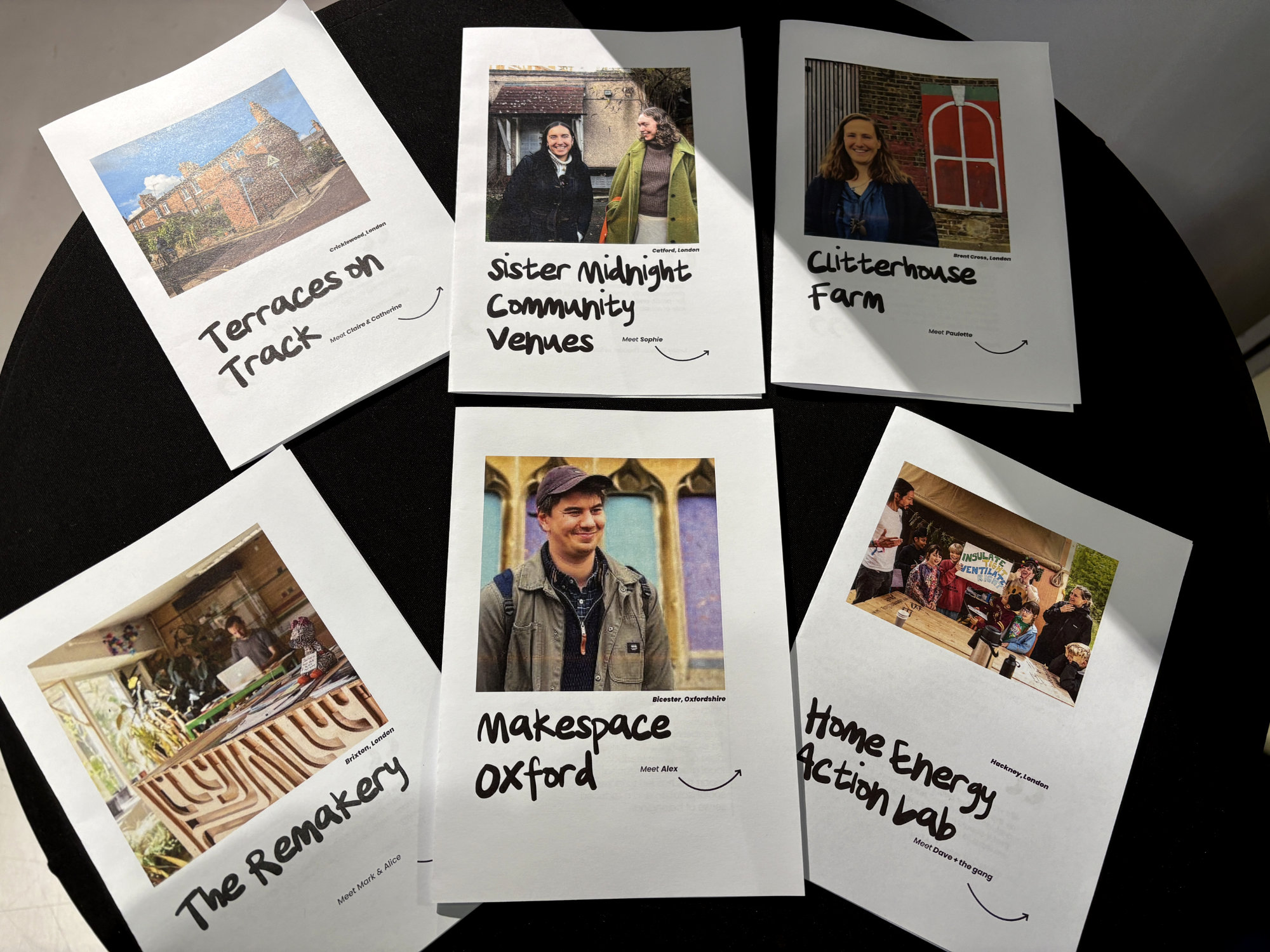What’s stopping community retrofit?
< Back to InsightsRewiring the system from the ground up
Community-led projects are powering forward on retrofitting buildings. They are turning vacant spaces into vibrant hubs, retrofitting homes collectively, creating jobs and skills in the process, and helping people feel proud of where they live. They are cutting carbon, improving comfort, and protecting public assets.
These groups are full of creativity, care, and commitment. But they are being held back by a system that wasn’t designed for them.
Despite their ability to deliver immense social value, these groups are frequently under-resourced financially and often operating at risk, without access to the professional expertise that could help them succeed.
What’s Stopping Us?
As part of the Retrofit 25 Exhibition – What’s Stopping Us? at the Building Centre, Collective Works, Footwork, and The National Retrofit Hub brought together six community innovators for an honest, energised conversation about their journeys, their impact, and what’s getting in their way:
- Sister Midnight Community Venues – who are working to transform a grassroots music venue in Lewisham;
- Makespace Oxford , who are working to unlock access to vacant space in the county;
- Terraces on the Tracks – a group of neighbours working together to build a collective approach to retrofitting their railway cottage homes
- The Remakery – a maker space focussing on material reuse in Brixton
- HEAL – a group of residents focused on developing the infrastructure for collective community-led retrofit action by building literacy, trust, confidence and motivation for positive change
- Our Yard at Clitterhouse Farm – a community café, garden and event space in a heritage asset within the Brent Cross regeneration area.

Each group is different, but all are driven by a shared mission to empower local people to improve their environments, upskill, and create lasting social infrastructure.
Community retrofit groups are driving ambitious, place-based solutions to the climate and housing crises. Their work delivers proven social, environmental, and economic returns. Yet their stories reveal a common struggle. They are overstretched, underfunded, and often left guessing through critical project stages. While the impact is real they often lack access to the early-stage funding and professional support that would speed up delivery and help innovators make informed decisions.
These initiatives aren’t looking for token gestures or superficial fixes. They need access to the same calibre of expertise – architects, engineers, planners, and skilled contractors – that any serious infrastructure project would require. Unfortunately, current funding models and social value schemes rarely account for this. Everyone wants to back a community retrofit project once it’s delivered and celebrated – but few are willing to support the early stages, when vision, risk, and trust matter most.
Tony, an M&E engineer, didn’t know how to meet his social value obligations under the 2023 Social Value Procurement Act. Like many contractors, he was unsure where to start. He co-founded OCO Connect, a CIC that links his network of skilled contractors with community groups who need them. They provide employment, training and skills within the local communities that they work in, and through their network encourage their supply chain partners to do the same, and since starting have almost become overwhelmed with uptake such was the positive response. It’s one example of the kind of relationship-based model that could be scaled to make a real difference.
Other initiatives, like Footwork’s People and Place programme and the National Retrofit Hub’s Retrofit Connect model, can show how mentoring and professional advice can be delivered meaningfully. But too often, community groups are left chasing the crumbs of CSR budgets with restricted capital grants, or shallow one-off volunteering days that offer little lasting benefit.
We need a better system
Community groups require:
- Unrestricted, early-stage funding to pay for capacity building – like project management, mentorship, and professional advice.
- Access to skilled professionals facilitating the right skills and the right time through funded placements, not just goodwill.
- Integration with existing procurement routes, such as seconding SMEs into council frameworks to give advice and fill Principal Designer roles.
- Policy incentives, like R&D-style credits, to encourage long-term professional involvement.
Social value isn’t a box to tick or a symbolic gesture. It emerges when communities are trusted, resourced, and supported to lead change on their own terms. This way, it can be transformational – both for the communities creating change, and the professionals who work alongside them. Relationships built on mutual respect and co-creation, not charity, are what bring projects to life.
If we want retrofit and place based regenerative initiatives to succeed at scale, we must shake up how we define and deliver social value. That means access to skilled expertise and funding from the start that respects their vision and builds their momentum. Community retrofit groups don’t need to be rescued — they need to be taken seriously.
So what now?
We’ve heard what’s stopping community retrofit. Now it’s time to act.
As conveners of this conversation, we’re committed to:
- Championing community-led retrofit in national policy and funding
- Connecting groups with professionals who can offer meaningful support
- Collaborating with funders, councils, and industry to unlock the early-stage investment these projects need.
But we need others to step up too.
If you’re a policymaker, funder, or professional with the means to offer real support, now is the time. Back community groups with the money, skills, and respect they need to deliver.
Sara Edmonds – National Retrofit Hub, Ellie Davies – Footwork and Alasdair Ben Dixon – Collective Works
Let’s have a chat about your vision and
how we can help you realise it.
Collective Works are an architecture & design studio. Our network of professionals will create your perfect solution.